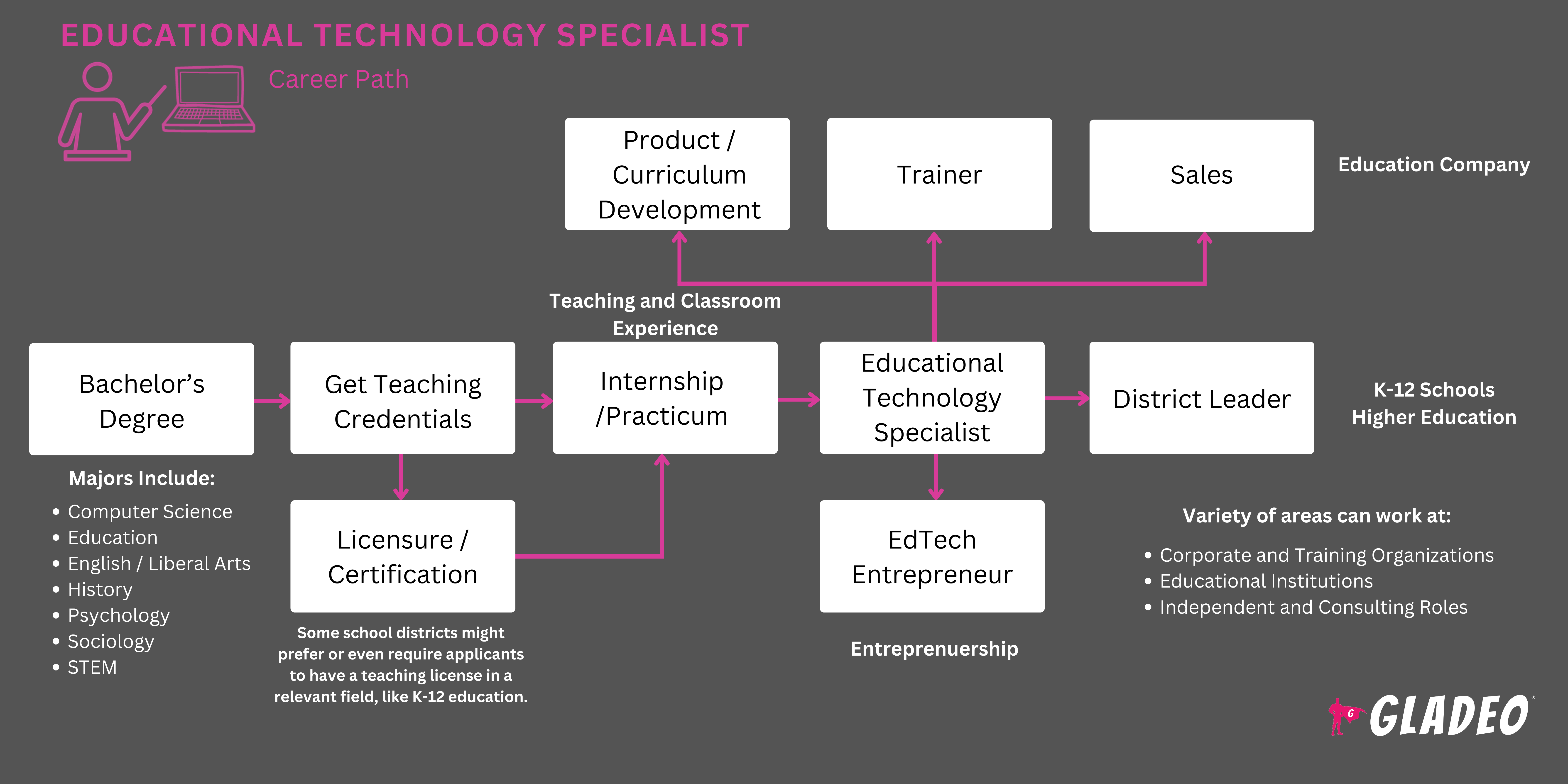Spotlights
Instructional Technology Specialist, Technology Integration Specialist, Educational Technologist, Digital Learning Specialist, eLearning Specialist, Technology Coordinator, EdTech Consultant, Learning Technology Specialist, Digital Education Specialist, Technology Coach
Educational Technology Specialists go by many names, including Ed Design, Learning Development, Instructional Technology, or simply EdTech Specialists. Their job duties are almost as varied as their job titles, but basically these workers assist schools with integrating modern technological tools into the educational system. From administrative platforms to instructional apps used by teachers and students, there is a wide range of critical components Edtech Specialists use to get schools up-to-speed so they can stay relevant in today’s high-tech world. Some maintain intranets and school networks, as well.
Edtech Specialists can work virtually anywhere that people need to learn things. Many are in the K-12 sector, while others stick to higher education institutions or even companies and government offices. Organizations rely heavily on Edtech Specialists to assist with selecting appropriate tools to use, then to provide the training on how to use those tools once they’re brought in. For example, an Edtech guru might advise teachers on how to adapt an existing curriculum for use via tables, laptops, and Zoom. They may assist administrative staff with finding ways to use data to determine problem areas within the student body. The possibilities, and responsibilities, are endless!
- Helping schools and organizations improve their teaching and training capabilities
- Empowering schools with tech that can identify gaps and areas for enhancement
- Supporting the modernization of our national educational system
- Benefiting students who need to learn important tech skills for their futures
“My favorite part of the job is I get the opportunity to learn about what’s actually out there, in terms of existing technology and apps and finding engaging ways to teach students that haven’t been done in a traditional classroom.The education world is finally realizing that we can’t continue teaching students in the twentieth century model.” Kristian Markus, S.Ed.Tech. Associate Director of Educational Technology, Study Smart Tutors
Working Schedule
- Edtech Specialists work standard full-time jobs, Monday through Friday. Those working at educational institutions will follow their employer’s schedule of holidays and breaks during academic terms (i.e. Winter Break, Spring Break, Summer Break).
Typical Duties
- Review organizational hardware and software to identify areas to update and modernize
- Work closely with organizations to determine their technology needs and wants
- Offer ideas for tech purchases and describe possible uses and functionality
- Help to procure necessary software licenses for use
- Allocate funds to buy hardware such as cameras or tablets, with the assistance of the resource manager
- Install or set up hardware and software, or aid computer support specialists with such setup
- Demonstrate features and train teachers or students on platform or app usage
- Offer suggestions for curriculum development that incorporates technology such as iPads, Google Classroom, and learning management systems
- Show administrators how to maximize and extrapolate collected data to target problem areas so resources can be deployed
- Assist schools with the professional development of teachers using tech in the classroom
Additional Responsibilities
- Teach workshops or provide one-on-one training
- Possibly manage a school webpage or social media dedicated to relevant topics
- Keep up-to-date on the latest developments and trends and discuss these with management
- Aid with maintenance of a network or intranet
- Offer tech support for various systems, as needed
Soft Skills
- Desire to help others
- Good at coordinating and instructing activities
- Highly organized
- Informed social and cultural awareness
- Inquisitive
- Logical and objective
- Patient and able to mentor others
- Persuasive
- Resourceful
- Sound judgment and decision-making
- Strong communication skills
- Tech-savvy
- Having strong writing skills (writing curriculum)
Technical Skills
- Strong familiarity with educational software designed for K-12 and higher education students
- Knowledge of mobile technology
- Budget planning
- Knowledge of video software
- Microsoft Office, Google apps, Macintosh software
- Familiarity with computers (PC or Apple), networks, and website building
- Understanding of school database automation systems
- Software: Light coding (HTML), apps out there (Jamboard, Screencastify)
- K-12 schools (public and private)
- Colleges, vocational schools, universities
- Governmental/military organizations
- Non-profit institutions
- Private companies and corporations
Edtech Specialists are required to be fully up-to-speed on the latest educational technology trends, so they can best serve the organizations they work for. They have to be able to see the big picture in terms of what their employer needs for hardware and software, keeping in mind budgetary restrictions.
They must also remember that once technology is brought in, users must be persuaded to adapt to it and learn how to use it. Sometimes such changes in group thinking aren’t easy to achieve, and Edtech Specialists may run up against pushback as they work to train staff on how on new programs, apps, or devices. It can take patience and perseverance, especially when a deadline for implementation is putting pressure on the team to succeed.
Edtech Specialists are in a somewhat new and burgeoning career field that is likely to expand as more and more schools and organizations come to see the advantages of incorporating technology. For-profit companies will especially get on board as they must stay competitive with peers in order to survive.
Many Edtech Specialists begin as licensed teachers, which is a huge advantage since they have boots-on-the-ground knowledge of what students need and what motivates them to stay engaged. Today’s younger generations have grown up with technology. They’re comfortable with it and eager to use it as much as possible. Schools are rapidly realizing they must not only teach tech skills, but in many cases they must first train their own teachers and staff how to use tech tools. COVID-19 forced institutions around the nation into a scramble to adapt tech and curricula that could be taught online, and when the pandemic winds down, those tools and plans will still be in place, able to be built upon.
Project-based learning and the technology that aids this type of learning.
Edtech Specialists may or may not have grown up with technology but they certainly gain an affinity for it at some point in their lives. Mainly, though, they can see and appreciate the value tech can add to virtually any situation, if used correctly. The ability to see the bigger picture or to think outside the box is something they might have always had, even as a child.
Most likely they were very curious about things, wanting to learn more and to try doing tasks in different ways from the norm. They “color outside the lines,” willing to take what might appear to be risks but only because they can see the advantages that others might not see. Another attribute is often their ability to persuade, to explain how something “could” work if given the chance!
“When I was in high school, I was so into technology and I wanted to learn computer science. So I created a class to learn web development at my high school. “ Kristian Markus, S.Ed.Tech. Associate Director of Educational Technology, Study Smart Tutors
- A related bachelor’s degree is the minimum academic credential to get started; a master’s degree is often needed
- Edtech Specialists are frequently certified and licensed teachers with an endorsement in educational/instructional technology. They have classroom experience.
- Each state has different requirements, so a teaching license is not required everywhere
- Endorsements may only require a few courses which can be done online
- Common classes include: Web 2.0 for Educators, Software and the Curriculum, Distance Education Research and Design, and Integration of Instructional Design and Educational Technology
- Prospective Edtech Specialists might opt to complete a school-based internship
- Some hold a master’s degree in education technology or a related field (M.Ed., EdM, EdS)
- Look for universities featuring educational training programs with solid reputations
- Stock up on classes related to curriculum development and classroom learning support
- If working on an endorsement, ask if the credits are applicable to a future master’s degree
- Review U.S. News’ Best Education Schools rankings to learn more about schools and programs
- Carefully review each programs’ website to learn about their enrollment and graduation data, diversity and inclusion, tuition rates, scholarships, and student organizations
- Decide if online, in-person, or hybrid courses are best for your goals. Given that you’ll be working in the Edtech sector, it might be useful to take some online classes to learn about their pros and cons from a student perspective
- Load up on practical tech courses aimed at teaching end users how to get the most from a device, platform, or app
- Take online courses to learn about different programming languages if they aren’t available at your college. The more technical knowledge you have the more effective edtech specialist you will be.
- Sign up for classes on analyzing and using data!
- If applicable, learn some programming and coding skills to beef up your resume
- Join computer clubs and volunteer to provide tech support to your school
- Hone up on your communication skills because as a future tech mentor and advocate, you’ll need them to teach and to persuade others
- Take writing courses so you can learn how to translate your thoughts into easy-to-understand content for written directions, instructions, or even curricula
- Develop your other soft skills, including leadership and team-building!
- Get as much teaching experience under your belt as you can, through paid or volunteer opportunities or internships
- Work closely with your academic advisors to map your path to becoming an Edtech Specialist
- Stay organized and keep track of your academic and work accomplishments for your resume or CV
- Be an active participant in professional organizations dedicated to the field, such as:
- CoSN (Consortium for School Networking)
- Foundation for Learning Equality
- iNACOL (International Association of K-12 Online Learning)
- ISTE (International Society for Technology in Education)
- ITEEA (International Technology and Engineering Educators Association)
- The Office of Innovation and Improvement
“Have a diverse and well-rounded background. Gain knowledge on a lot of things. Be curious. Get your teaching credential, gain classroom experience, tutoring...etc.” Kristian Markus, S.Ed.Tech. Associate Director of Educational Technology, Study Smart Tutors

- Qualified Educational Technology specialists will most likely have little trouble finding work once their applicable degree or endorsement is finished
- Work closely with your academic department or career center to locate and apply for good-paying jobs
- Let your peer network know when you’re about to start applying and keep reminding them to pass on tips
- Scour job portals such as Indeed, Monster, Glassdoor, and even LinkedIn and set up alerts for new postings
- Before applying, reach out to coworkers, professors, and supervisors to ask their permission to list them as references
- When reviewing job ads, make sure you meet all listed qualifications and experience requirements. If you don’t, it’s probably a waste of time to apply
- Polish your resume/CV and make it impactful by detailing hard stats when possible
- Read industry websites and articles to keep current on trends so you can speak about them during interviews, if asked
“Be curious and constantly be learning: Constantly brush up your skills. Because technology keeps changing, you have to brush up your skills and the newest technologies.” Kristian Markus, S.Ed.Tech. Associate Director of Educational Technology, Study Smart Tutors
- Show your dedication each day by being on-time, offering solutions to problems, and being positive about the changes technology can bring to your organization
- Once you’ve mastered your primary duties, don’t be afraid to ask for increased responsibilities
- Demonstrate your worth to management by adding value across the board, from leadership to end-users (to include teachers and students, if working at a school)
- Maintain an impeccable work ethic and keep track of tangible performance indicators
- Be a team player able to facilitate change in an efficient manner
- Listen to teachers on the frontlines and to students who offer insights or complaints, and take action to clearly identify and resolve problems
- Always stay on top of breaking developments and be a vocal advocate for continual improvements
- Engage with professional organizations, teach workshops, mentor teachers, and do everything you can to help students succeed
- Time permitting, share your lessons learned with peers online, via a blog or portfolio
Websites
- 21 Apples
- 21st Century Educational Technology and Learning
- Ask a Tech Teacher
- Association for Educational Communications and Technology
- Bud the Teacher
- CoSN (Consortium for School Networking)
- Digital Promise
- EdTech Sandy K
- edTech Vision
- Educational Technology and Mobile Learning
- Educational Technology Guy
- E-Learning Queen
- Emerging EdTech
- FLE (Foundation for Learning Equality)
- Free Technology for Teachers
- FRS (Future Ready Schools)
- Hack Education
- High Techpectations
- iLearn Technology
- iNACOL (International Association of K-12 Online Learning)
- International Society for Technology in Education
- ISTE Standards for Educators
- ITEEA (International Technology and Engineering Educators Association)
- OII (Office of Innovation and Improvement)
- Teach42
- Teacher Reboot Camp
- The Innovative Educator
- The Nerdy Teacher
- Web20Classroom
Books
- A New Culture of Learning: Cultivating the Imagination for a World of Constant Change, by Douglas Thomas and John Seely Brown
- Digital Game-Based Learning, by Marc Prensky
- Education, Technology, Power: Educational Computing as a Social Practice, by Hank Bromley
- How Computer Games Help Children Learn, by David Shaffer
- Instructional Technology and Media for Learning, by Sharon E. Smaldino, et. al.
- Rethinking Education in the Age of Technology: The Digital Revolution and Schooling in America, by Allan Collins and Richard Halverson
- Teaching with the Tools Kids Really Use: Learning With Web and Mobile Technologies, by Susan Brooks-Young
- The World is Open: How Web Technology is Revolutionizing Education, by Curtis Bonk
The exciting world of Edtech can be fast-paced and sometimes complicated. As critical as it is for our future, it is certainly not every educator’s cup of tea, though! The Bureau of Labor Statistics offers many alternative career paths in the ed sector to consider, including:
- Adult Education
- ESL Teachers
- Career/Technical Education Teachers
- Elementary, Middle, and High School Principals
- Kindergarten and Elementary School Teachers
- Middle School Teachers
- Postsecondary Teachers
- Preschool Teachers
- Career Counselors
- Special Education Teachers
- Product Manager at an edtech company
“It’s a quickly growing industry. If you are curious and looking to be challenged (never doing the same thing), this is a great field for you. No two days are the same.” Kristian Markus, S.Ed.Tech. Associate Director of Educational Technology, Study Smart Tutors
Newsfeed

Programs at Foothill
Featured Jobs

Online Courses and Tools












